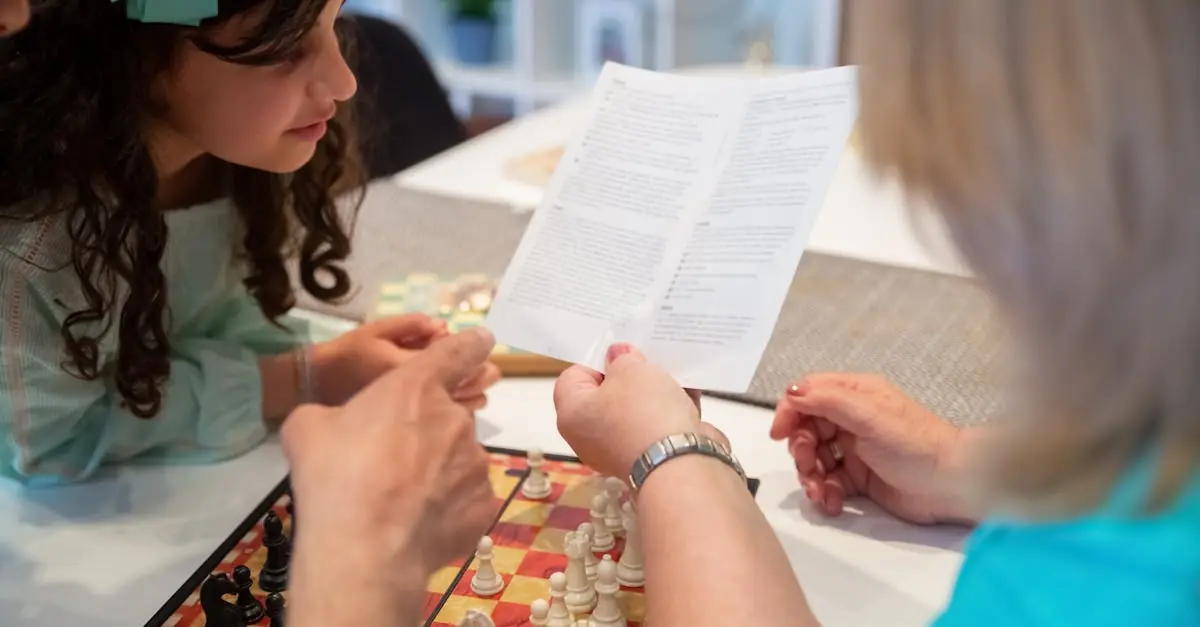Navigating the world of co-parenting can feel like trying to assemble IKEA furniture without the instructions—confusing and often frustrating. Yet, with the right co-parenting rules in place, it can transform into a smoother experience. It’s all about teamwork, communication, and maybe a little humor to lighten the load. After all, raising kids is a marathon, not a sprint, and every good marathon runner knows the importance of a solid game plan.
Whether you’re fresh out of a relationship or have been co-parenting for years, establishing clear guidelines can make all the difference. It’s not just about sharing custody; it’s about ensuring that both parents are on the same page when it comes to raising happy, healthy kids. So, grab a cup of coffee, put on your best co-parenting hat, and let’s dive into the essential rules that can help make this journey a lot more enjoyable.
Table of Contents
ToggleUnderstanding Co Parenting
Co-parenting involves two parents working together to raise their children after separation or divorce. A successful co-parenting relationship hinges on cooperation and shared goals.
Definition of Co Parenting
Co-parenting refers to both parents assuming equal responsibility for the child’s upbringing, regardless of their personal relationship. Two parents collaborate on decisions concerning education, health care, and emotional well-being. Open communication plays a vital role in effective co-parenting, ensuring both parties remain informed and involved. This shared commitment fosters a stable environment where children can thrive.
Importance of Co Parenting
Co-parenting significantly impacts a child’s emotional and psychological health. Research indicates that children benefit from both parents actively participating in their lives. Stability arises when parents model healthy cooperation and conflict resolution. Prioritizing the child’s needs reinforces a sense of security and belonging. Effective co-parenting strategies can lead to improved outcomes in academic performance and social behavior for children.
Essential Co Parenting Rules
Co-parenting requires adherence to essential rules that enhance collaboration and harmony. By following these guidelines, parents can ensure a more effective partnership in raising their children.
Communication Is Key
Establishing open lines of communication sets the foundation for successful co-parenting. Parents must share information about their child’s daily activities and academic progress. Regular check-ins create opportunities to discuss concerns or decisions. Text messages and shared calendars can help maintain clarity about schedules and obligations. Disagreements should be addressed respectfully and directly, minimizing misunderstandings. Consistent communication fosters trust and strengthens the co-parenting relationship, acting as a cornerstone for a stable environment.
Staying Consistent with Parenting Styles
Maintaining consistency in parenting styles helps provide children with stability. Parents should discuss and align on important values and discipline approaches. When rules and expectations are similar between households, children exhibit fewer behavioral issues. Engaging in family meetings allows both parents to present a united front. Disparities in parenting can lead to confusion for children, affecting their sense of security. Establishing clear guidelines facilitates a supportive environment, and it reinforces healthy boundaries for all involved.
Respecting Each Other’s Parenting Time
Respecting each parent’s designated time with the children fosters healthy relationships. Punctuality upon drop-off and pick-up builds trust and reliability. Parents should avoid interrupting or infringing on the other’s time, allowing children to bond with each parent independently. Flexibility is important, but both parties should strive to adhere to agreed-upon schedules. Clear boundaries around parenting time also promote emotional security for children. Acknowledging each other’s role emphasizes the importance of cooperative parenting in their lives.
Challenges in Co Parenting
Co-parenting can present various challenges. Navigating disagreements and dealing with new partners often rank among the most significant issues faced by co-parents.
Navigating Disagreements
Disagreements are common in co-parenting scenarios. Prioritizing a child’s best interests helps parents focus on resolution rather than conflict. Listening actively promotes understanding, while maintaining open lines of communication fosters collaboration. Establishing a structured environment, such as regular check-ins, minimizes the risk of misunderstandings. Keeping discussions child-focused encourages constructive conversations. Utilizing neutral language aids in diffusing tension, making it easier to find common ground.
Dealing with New Partners
New partners can complicate co-parenting dynamics. Introducing a new partner into the child’s life requires careful consideration and honest communication. Prioritizing feelings helps navigate potentially sensitive situations. Discussing new relationships with each other ensures everyone remains on the same page. Being respectful of each parent’s boundaries is vital for emotional security. Encouraging a positive relationship between children and new partners contributes to a harmonious family environment. Setting clear expectations minimizes confusion and enhances stability for everyone involved.
Tips for Successful Co Parenting
Successful co-parenting hinges on clear communication and defined boundaries. Establishing rules helps maintain respect and cooperation between parents.
Setting Boundaries
Effective boundaries create a structured environment for children. Each parent should clearly define their roles and responsibilities. Discussing expectations prevents misunderstandings and promotes cooperation. Transparency in scheduling time and obligations reduces conflicts. Parents encourage consistency by adhering to these agreed-upon limits. Checking in regularly helps reinforce these boundaries. Clear limits empower children to understand family dynamics, fostering a sense of security.
Prioritizing the Child’s Well-being
Focusing on the child’s best interests is essential. Organizations like the American Academy of Pediatrics emphasize emotional and psychological development. Parents should jointly decide on education, health care, and emotional support, ensuring aligned goals. Open discussions about the child’s needs cultivate a supportive environment. Listening actively to the child’s feelings enhances emotional connections. Involvement in activities and routines strengthens relationships with both parents. Prioritizing the child’s happiness ensures a stable and nurturing upbringing.
Co-parenting can be a complex journey but it’s also an opportunity for growth and collaboration. By adhering to established rules and maintaining open lines of communication parents can create a positive environment for their children. Prioritizing the child’s well-being and fostering mutual respect between parents lays the foundation for a successful co-parenting relationship. Embracing teamwork and navigating challenges together ultimately leads to healthier outcomes for children. With commitment and understanding both parents can thrive in their roles and support their children’s emotional and psychological development.




